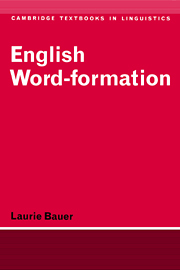Book contents
- Frontmatter
- Contents
- Dedication
- Preface
- 1 Introduction
- 2 Some basic concepts
- 3 Lexicalization
- 4 Productivity
- 5 Phonological issues in word-formation
- 6 Syntactic and semantic issues in word-formation
- 7 An outline of English word-formation
- 8 Theory and practice
- 9 Conclusion
- Bibliography and citation index
- Index
- Frontmatter
- Contents
- Dedication
- Preface
- 1 Introduction
- 2 Some basic concepts
- 3 Lexicalization
- 4 Productivity
- 5 Phonological issues in word-formation
- 6 Syntactic and semantic issues in word-formation
- 7 An outline of English word-formation
- 8 Theory and practice
- 9 Conclusion
- Bibliography and citation index
- Index
Summary
Word-formation is such a confused area of study at the moment that it would not be possible to write an uncontroversial introduction to the subject, and this book accordingly reflects my own beliefs and prejudices. It is my hope that if I cannot convince students and scholars of the correctness of my own point of view, I can at least provide them with a coherent position to argue against. Much of the confusion in word-formation studies is terminological, and one of my aims in this book is to put forward some suggestions for a standard terminology. Most of my proposals (terminological or otherwise) are not, of course, original, and the bibliography will show where they originated.
I should like to thank all those who have given so generously of their time in helping me to prepare this book. My colleagues have all patiently answered innumerable questions on various aspects of linguistic theory and practice. Max Cresswell was particularly helpful with philosophical and semantic issues and Ken Russell with statistical matters. Rainer Bäuerle, Charles J. Fillmore, Janet Holmes, Peter Matthews and Frank Palmer all read the first draft, and their invaluable comments have helped me correct many errors and infelicities. I alone am responsible for those that remain. I must add that none of these people is in any way accountable for the content or argumentation of this book, nor do they necessarily agree with the points made.
- Type
- Chapter
- Information
- English Word-Formation , pp. xiii - xivPublisher: Cambridge University PressPrint publication year: 1983



